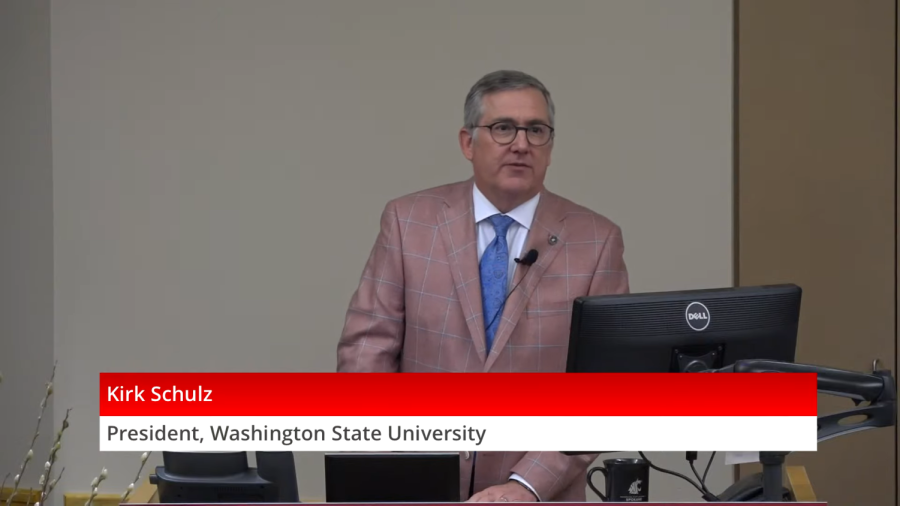Kirk Schulz addresses WSU’s tribal relations in State of the University address
From expanding relationships with Native American Tribes to Pat Chun testifying before congress
COURTESY OF WSU ACADEMIC OUTREACH AND INNOVATION
WSU President Kirk Schulz gave his fourteenth State of the University Address Tuesday March 28 in Spokane
March 30, 2023
WSU President Kirk Schulz gave his 14th State of the University Address Tuesday in Spokane regarding topics such as WSU’s mission as a land-grant institution and what WSU is doing with their tribal partners across the state.
Other topics included diversity, equity and social justice, the introduction to a third pediatric residency program, and why WSU altheltic director Pat Chun is testifying before Congress.
Schulz said WSU does not want to stay at a standstill when it comes to its tribal relations; they want to be able to expand them.
As a result of this, they have moved the Office of Tribal Relations to the Office of the President, Schulz said.
“We wanted to make sure that we were elevating that appropriately within our organization to say, we want to be doing this everywhere across the state with our extension offices with each of our campus communities, research and teaching centers,” Schulz said.
Schulz said WSU is looking forward to working with more tribal communities.
Just this last spring, WSU’s Board of Regents ratified a policy that recognizes tribal sovereignty when it comes to university research, policies and other projects that affect tribes and tribal land, Schulz said.
This policy was led by Zoe Higheagle Strong, vice president for Native American Relations and Tribal Liaison to President.
The Advisory Board also guided WSU in developing a tribal nation-building leadership program to support native student development and achievement in college and beyond to better reflect cultural values, Schulz said.
“This program provides scholarships for Native American students, cultural value reciprocity is the heart of college and career prospects among Native peoples and nations education that gives back to family tribes and natural environment and the land itself,” Schulz said.
WSU is also making many advancements as well when it comes to expanding healthcare.
Schulz said the Native American Health Sciences program is making a certificate in indigenous healing perspectives.
This curriculum enhances current and future healthcare professionals’ knowledge and proficiency when working in healthcare in other settings serving indigenous communities, Schulz said.
“We talk about our core mission in rural and underserved areas and doing things differently. This is the type of thing WSU issues in taking a leadership role in,” Schulz said.
Schulz said WSU also is recognizing the public education headwinds in social justice and equity.
WSU recently held Hostile Terrain 94, a participatory art exhibit created by the undocumented migration project.
The installation raises awareness about the realities of the U.S.-Mexico border focusing on the deaths that have occurred almost daily since 1994.
“This is what we should do as a part of higher education. It gives people an opportunity to hear different points, to be exposed to different things,” Schulz said.
WSU is also celebrating the introduction of a third pediatric residency program to the Elson S. Floyd College of Medicine.
“It is about better health for the citizens of Washington and then beyond,” Daryll DeWald, chancellor of WSU Spokane and executive vice president of Health Sciences, Schulz said.
He also said Chun is going to be testifying to congress regarding name, image and likeness when it comes to college athletes.
Former college athletes have not been able to make money over their name, image and likeness. This issue arose when video games included the names and number of college athletes, however, these athletes made no profit off of it being used.
According to Schulz, Senator Maria Cantwell and Representative Cathy McMorris Rodgers of Washington reside in the commerce side of Congress, which is where the issue resides.
“The state of Washington is going to play a huge role in what the national name, image and likeness legislation may turn out to be given our relationship with both of those elective officials,” Schulz said.
















